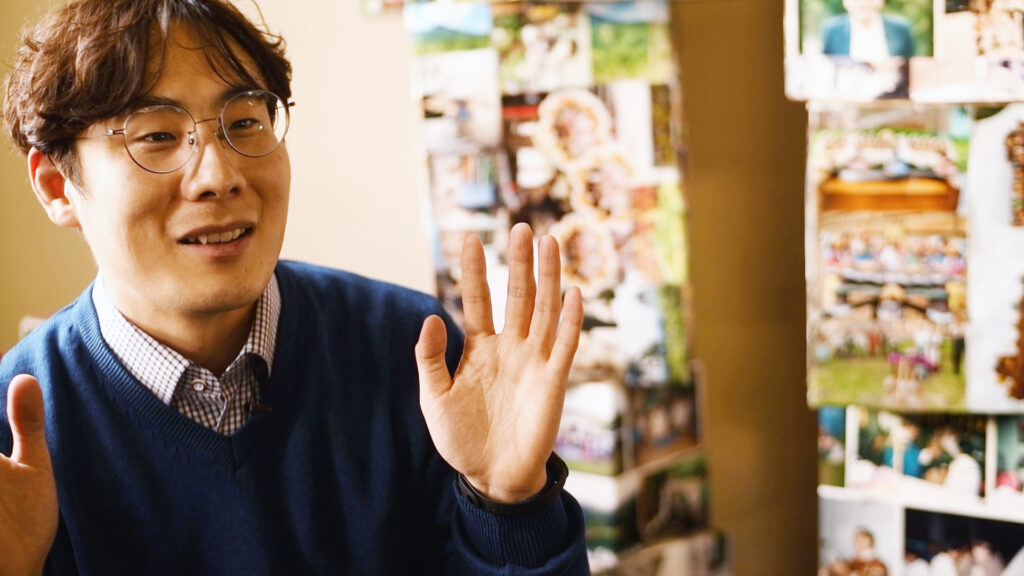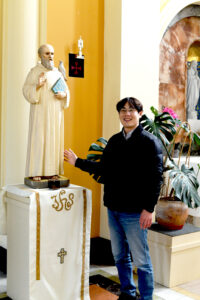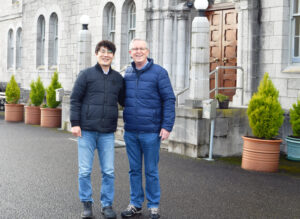
Columban seminarian Verano Lee Jeong-Rak from Korea. Image: Columban Mission Images
Columban seminarian Verano Lee Jeong-Rak speaks to Sarah Mac Donald about his journey back to faith and his vocation to missionary priesthood.
St Verano is not one of those popular saints whose name trips off your tongue. The 6th century French hermit has all but been forgotten by most of the faithful, perhaps with the exception of churchgoers who attend a small church dedicated to his memory outside the Italian town of Pisa. However, when a Korean couple celebrated the arrival of their first-born forty-one years ago on 19th October, they were in no doubt their infant son should be named in honour of the saint on whose feast day he was safely delivered into the world.
Verano Lee Jeong-Rak is a Columban seminarian who is studying to be a missionary priest. He grew up in a Korean family where both his parents had converted to Catholicism and so faith was important in his homelife, for his parents, for Verano himself and for his younger sister.
Verano joined the Columbans six years ago in 2017. He was not a pious youth destined for the Church. In fact, for many years, Verano had no faith. “I worked in a real estate agency for six years. In the evenings I went to university. I was paying for my studies because my father’s company had gone bankrupt.” His faith took a knock with the collapse of his father’s company, a traumatic event which coincided with his mother’s serious illness and his sister losing her eyesight. “With all that, I couldn’t believe in God. I felt, ‘If you exist, how could all of this happen to my family?’”
“I denied the existence of God until I was 26. My parents continued to ask me to go to church but I always refused. My mother urged me to go to adoration. One day I decided to go. There was nobody else there, so I slept in the church. I had an hour before I had to go to college, and it was a chance to have a rest. After that, I continued to go to the Church and would take a nap. But one day, I didn’t take a nap, in fact I got curious about the Bible that was there. I opened it and started to read it. Bit by bit, as I continued to go to the church for the Holy Hour, I began to talk to God about my life. One day I cried. For a time, after that, I cried or talked about my life and emotions to God. That was the time of my conversion – I started to have a faith. After that I changed.”
“I graduated from university with a degree of social policy, and I decided to become a social welfare officer. I worked in this area for two years, but I felt frustrated because even if I wanted to help people, the law and policy would get in the way. Some people who were in need lost their subsidies under government cutbacks. It was very hard for them; they would ask me why I cut their subsidies. But it wasn’t my fault! I felt really sorry for them and wanted to help but was limited by the law.”
“At around this time, the desire to be a priest had half formed in my mind, but I also wanted to get married. One holiday, I was on my way home when I had a serious car accident. I was hospitalised for over a month. As I was recovering, I began to think about my life and what was the best path for my future. I felt that my life had a point in the eyes of God and that maybe He was calling me, and it was time to follow Him. When I was fully recovered, I decided to join the seminary.”
“My parents were really surprised by my decision and my friends couldn’t believe it. But I shared about my faith, and they told me it was my decision, and they would support me. Some of my friends were baptised.”
“I joined the diocesan seminary but in my first year I began to feel called to missionary priesthood. A Sister who worked in my home parish when I was young recommended the Columbans. I met a Columban priest for a period of a year and then I decided to join. I had done three years in the diocesan seminary. I feel God guided my choice.”

Visiting Ireland was “a dream” which Verano long harboured. A visit to the chapel in Dalgan Park provided him with an opportunity to see its statue of the Society’s patron, St Columbanus. Image: Columban Mission Images
“I have now been six years with the Columbans, and this year is my last year of study. I am waiting for the General Council to decide on my First Mission Assignment. I was assigned to Chile but that was cancelled because of the Covid pandemic.”
“I am 41 now and I first came into contact with the Columbans when I was 34. I am considered a late vocation in Korea. Joining a diocesan seminary when you are over 30 requires the permission of the bishop. But among the Columbans, the age profile is very mixed. The other students include two others who are over forty as well as two who are 23 and 21. An older student has a lot of life experience to offer and that is a good thing, but it can be difficult to adapt or change. So, there are pros and cons to late vocations.”

Verano Lee Jeong-Rak with Fr Padraig O’Donovan, Vocations Director for the Columbans in Ireland. Image: Columban Mission Images
“I spent my spiritual year in the Philippines; the poverty was shocking at times. I helped with the ministry to the people living in the slum cemetery in Manila. It is hard to explain how difficult their life is. So very shocking. They live and sleep in the cemetery. They built their homes on the tombs. Life is very tough – having to wash in a public place. But even though they are very poor, these people are very generous. They want to share what they have.”
Sitting in Dalgan Park, after completing his English language course, Verano tells the Far East that many Columban priests “have been a big inspiration” in his life. His visit to Ireland was “a dream” he had long harboured since reading ‘The Red Lacquered Gate’ about the Society’s “noble” co-founders, Bishop Edward Galvin and Fr John Blowick. “After reading about the history of the Columbans, I really wanted to come to Ireland and look around Dalgan Park. It is really beautiful. The most symbolic place for me is the cemetery where you can see the history of all the Columban members, from the two founders, who are both buried in Dalgan, to the most recently deceased. This life is not easy – living in another country as a missionary. But it is inspiring.”
